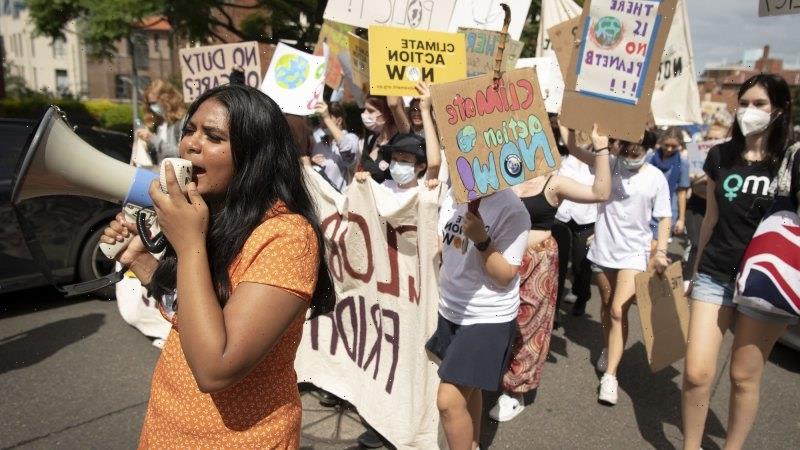Reducing the voting age to 16 will be one of the first issues put to parliament in the new year as the Greens push to give younger Australians a say in politics.
Giving teenagers the right to vote is a top priority for the Greens in 2023, the party’s youth spokesman Stephen Bates said. The Brisbane MP submitted notice to move a bill to lower the voting age to give 16 and 17-year-olds the right to vote. He says it will be the first private members’ bill moved in the lower house when parliament resumes in February.
School students protesting for climate action earlier this year. The Greens want to give 16 and 17-year-olds the vote.Credit:Wolter Peeters
“Sixteen and 17-year-olds can drive cars, work, enlist in the Australian Defence Force, and serve
their communities, yet they have no say in the composition of their own government,” Bates said.
“Students are taking to the streets in their thousands to demand action on the climate crisis.
They have no other choice. They’re being left out of the critical decisions that impact them
and want their voices to be heard.”
In this year’s Mission Australia Youth Survey of nearly 19,000 15 to 19-year-olds, 51 per cent said the environment was one of the most important issues in Australia, and nearly 36 per cent said equality and discrimination was a key issue. Mental health was the third most important issue, according to the survey.
Earlier this year school students protested at Kirribilli house, demanding then-prime minister Scott Morrison take greater action against climate change.
Brisbane Greens MP Stephen Bates will move a bill to lower the voting age.Credit:Alex Ellinghausen
It’s the second time the party has attempted to get the voting age lowered in the last five years after Greens senator Jordon Steele-John introduced a bill in 2018. That bill was sent to a committee for an inquiry and in 2019 the committee, led by LNP senator James McGrath, recommended it not be passed.
“Ultimately, in this test of our electoral processes, this bill was found wanting,” McGrath said in the committee report.
Steele-John’s bill proposed to make voting voluntary for 16 and 17-year-olds and allow those down to age 14 to enrol to vote. Bates’ version is modelled on Steele-John’s but would make voting compulsory for 16 to 17-year-olds, and waive fines for those teenagers who fail to vote.
Voting age debates have happened around the world. In 2007 Austria became the first European country to allow 16 and 17-year-olds to vote in all elections, and several South American countries including Brazil allow teenagers to vote. Debates over lowering the voting age have been ongoing in the UK and New Zealand.
Labor has also previously supported reducing the legal voting age to 16.
In a 2015 speech at a Young Labor conference, then-opposition leader Bill Shorten called for the voting age to be lowered, noting 16 and 17-year-olds can work and pay tax, drive, fly a plane, and make their own medical decisions.
“I want Australia to think about lowering the voting age, to give more young Australians a say,” he said at the time.
“Young Australians like you deserve the right to shape the laws and policies that shape your lives.”
Teenagers can join Young Labor from 15, and the Young Liberals from the age of 16. Teenagers can also join the Australian Greens.
Cut through the noise of federal politics with news, views and expert analysis from Jacqueline Maley. Subscribers can sign up to our weekly Inside Politics newsletter here.
Most Viewed in Politics
From our partners
Source: Read Full Article


